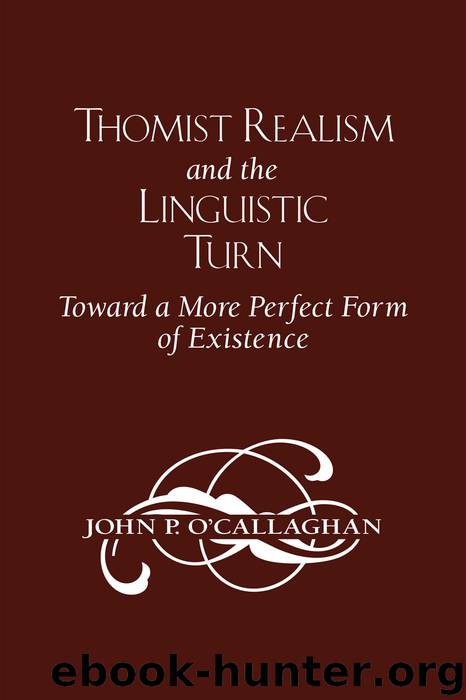Thomist Realism and the Linguistic Turn by O'Callaghan John P.;

Author:O'Callaghan, John P.;
Language: eng
Format: epub
Publisher: University of Notre Dame Press
Published: 2016-03-06T16:00:00+00:00
Res and Ens in St. Thomas
I have argued thus far that concepts are not “third things” interposed between the act of intellect and objects in the world. But is it altogether inappropriate to call concepts things in any sense? From many of the critics it would seem so. Many believe, in Sokolowski’s terms, that we must once and for all “exorcise them.” Against the background of St. Thomas’s metaphysical analysis of being (ens) and thing (res), in the next section I will explain the sense in which concepts can be called things, and why we need not exorcise them. J. L. Austin writes in a different context, “there’s the bit where you say it and the bit where you take it back.”63 Having said that concepts are not “third things,” this is the bit where I take it back, though not entirely.
It is important not to completely abandon the use of ‘thing’ (‘res’) in this Thomistic account of concepts. As used by St. Thomas, ‘res’, like ‘ens’, is an analogous term; indeed it is very much like ‘ens’ in that it expresses a mode of ens, “which is not expressed by the name of ens itself.” Though it does not “add” to the signification of ‘ens’ by expressing a “restricted manner of ens,” as each of the categories do, it “adds” to it by expressing “a manner that generally follows every being.”64 So of everything of which ‘ens’ is said, ‘res’ is also said.
When analyzing the ways in which ‘ens’ is said, St. Thomas initially divides the senses into two classes. According to him, in one sense it is said of anything of which a true affirmative proposition can be formed. In this sense, ‘ens’ is said to indicate the truth of a proposition. In this latter sense we may say that defects, lacks, absences, fictional creatures, and so on, are entia (beings). In this sense, ‘ens’ may be said of blindness or unicorns, since we might say truly “blindness is a pathology in beings who ought to have sight,” or “unicorns are sung about in Irish songs.”65 In this sense, ‘ens’ may also be said of dogs, men, quantities, colors, and acts, since one may form true affirmative propositions about them. So in this sense at least, one can say that concepts are ens because one can truly say “concepts are written about by those who wish to deny their existence,” just as one might truly say that “the present king of France is written about by those who wish to deny his existence.”
Here, under threat of contradiction, ‘ens’ cannot be synonymous with ‘what has existence’, where ‘existence’ has the sense that it has in “the present king of France is written about by those who wish to deny his existence.” Since the present king does not have existence in the sense that it is truly denied of him, to say that he is an ens in that sense would be to assert that he both exists and does not exist.
Download
This site does not store any files on its server. We only index and link to content provided by other sites. Please contact the content providers to delete copyright contents if any and email us, we'll remove relevant links or contents immediately.
| Anthropology | Archaeology |
| Philosophy | Politics & Government |
| Social Sciences | Sociology |
| Women's Studies |
The remains of the day by Kazuo Ishiguro(8382)
Tools of Titans by Timothy Ferriss(7807)
Giovanni's Room by James Baldwin(6807)
The Black Swan by Nassim Nicholas Taleb(6761)
Inner Engineering: A Yogi's Guide to Joy by Sadhguru(6439)
The Way of Zen by Alan W. Watts(6288)
Asking the Right Questions: A Guide to Critical Thinking by M. Neil Browne & Stuart M. Keeley(5355)
The Power of Now: A Guide to Spiritual Enlightenment by Eckhart Tolle(5330)
The Six Wives Of Henry VIII (WOMEN IN HISTORY) by Fraser Antonia(5234)
Astrophysics for People in a Hurry by Neil DeGrasse Tyson(4998)
12 Rules for Life by Jordan B. Peterson(4160)
Housekeeping by Marilynne Robinson(4059)
The Ethical Slut by Janet W. Hardy(4036)
Skin in the Game by Nassim Nicholas Taleb(3965)
Double Down (Diary of a Wimpy Kid Book 11) by Jeff Kinney(3922)
Ikigai by Héctor García & Francesc Miralles(3889)
The Art of Happiness by The Dalai Lama(3844)
Skin in the Game: Hidden Asymmetries in Daily Life by Nassim Nicholas Taleb(3720)
Walking by Henry David Thoreau(3681)
